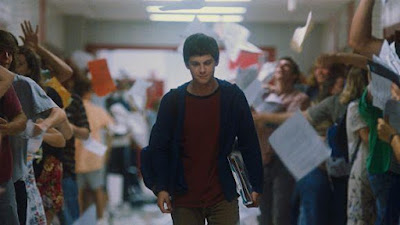Something from Nothing
or
No Man is an Island of Misfit Toys
Charlie (Logan Lerman) is starting his first year in High School as a freshman and he has a lot to learn. He's shy, introverted, and fragile the result of some trauma we know not what going in. He walks the corridors friendless, a punching bag for the cool kids and their posses. His parents (Dylan McDermott and Kate Walsh) are lightly caring, and his English teacher (Paul Rudd) reassures—"If you make one friend on your first day, you'll do good." "If my English professor is the only friend I make today, that'll be sorta depressing."
But Charlie does have one friend, writing to him about his experiences, pouring out his frustrations and observations in letter after letter about his "trying not to be a loser." The friend is anonymous, may not even exist, or once existed, but those letters keep Charlie going and serve as his avenue of expression, rather than having his day pulled out of him at the family dinner table. It's an uphill battle from some valley that isn't discussed, but Charlie is self-aware enough to know some perspective. "My life is officially an after-school special," he grouses.
At a football game, he meets Patrick (Ezra Miller), a senior and the subject of some casual bullying, but Patrick has a wicked sense of humor that he throws out with no hesitancy as a shield. Charlie gravitates to him, and meets Patrick's step-sister Sam (Emma Watson), also a Senior, but who is coming back from "having a reputation." After the football game, the three hang out at a diner and compare notes of commonality, which involve a distinct lack of fitting in with the high school social structure, and Charlie is introduced to more of the group, who hold fast, hang out, and provide safety in numbers and a fresh perspective on the puerile benefits of normalcy.
The Perks of Being a Wallflower (written and directed by Steven Chbosky from his own novel) is a fine quirky example of a "Coming of Age" movie, that sub-set of the teen flick where lessons are learned (his life really is an after-school special) and is not so much a film about growing up, as growing out. Growing out of the insular self-inspection, narcissism and selfishness that is comfortable and has no risk, it's dark and warm and safe in that little "black cave of the psyche." But is it? That cave only echoes one's own thoughts back to us, providing no perspective and no horizon to reach to or for.
Yeah, it's pretty safe in there...if there aren't any demons or other creatures of the nightmare lying in wait to strike when you're most vulnerable. And we all have those. And even if we don't, the echoes of our own thoughts are only phantoms and zephyrs, not sustaining, and if that's all we cling to, they become echoes of echoes, distorting, becoming less clear, and often impenetrably undecipherable—a feedback loop.
And feedback loops, uninterrupted, can become weapons.
Charlie is scared. And ashamed. And that limits his choices, when he does make a choice. Most of the time, things are just foisted on him and he has to make a decision: like this, or don't? Comfortable or not? Aware, or comatose? And by the time, he makes a decision, it's usually too late, putting him a tail-spin, and another trap. His fellow wallflowers are in traps, too (isn't that what High School is all about?), but one thing he learns is that they're not the only ones and the traps, self-made or imposed are universal.
It's a good film, with good imagery, but a neophyte director's tendency to hit things a little too square—the shot from the communion wafer to the LSD tab, please—but the performances feel real, Emma Watson is a helluva dancer, and it's a good trip down memory lane, now that it's gone and out of our lives. "See ya, wouldn't wanna be ya"
For the truth of the matter is, we all grow out. We couldn't survive if we didn't. Yes, "we are infinite" as the movie's tag line wants to be sure we know.
But not individually.
And not by ourselves.
 |
| Out of the black cave and into the light |






No comments:
Post a Comment